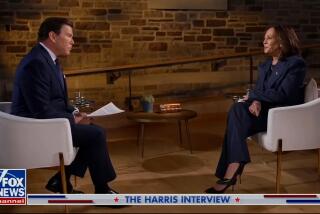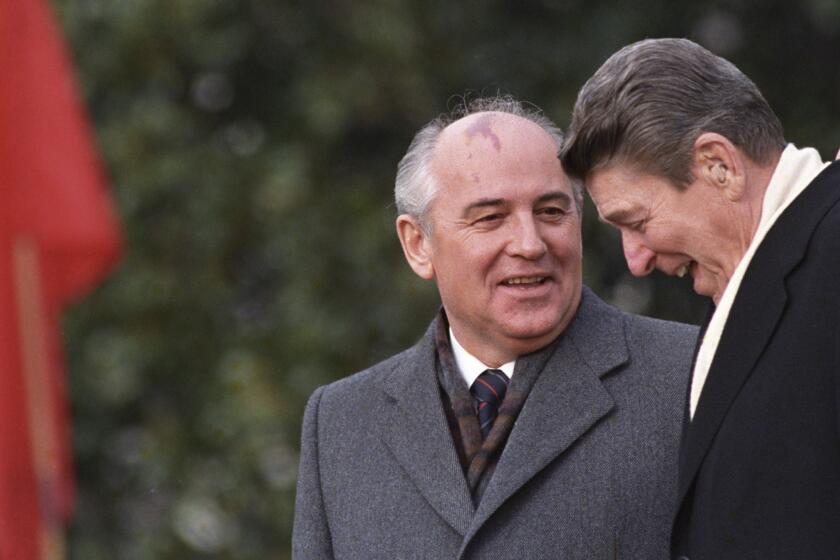‘Nightline’ Sets Interview With Dukakis, but Not Bush
- Share via
NEW YORK — “Nightline” anchor Ted Koppel, who offered both presidential candidates time on ABC for a joint interview, will interview Gov. Michael Dukakis live from Denver on Tuesday, the network said Thursday.
ABC News President Roone Arledge, who said Vice President George Bush had rejected ABC’s offer, said the 90-minute interview of the Democratic candidate on “Nightline” will start at 11:30 p.m. EDT.
It will air on a tape-delayed basis at 11:30 p.m. the same night on the West Coast.
Arledge, whose original proposal was made Sept. 30, five days after the first of two presidential debates, made the Dukakis announcement to visiting TV reporters here at a press conference in which he also:
--Criticized those running the two candidates’ bids for the White House for creating packaged-for-TV conventions and campaigns that don’t address the issues and, indeed, avoid them.
--Said that “World News Tonight” next month will start a new weeknight segment, “American Agenda,” regularly reporting on the general topics of health, family, environment, education, money and drugs.
--Said he’d like a new one-hour prime-time news series that may start in January to be “basically a live program,” and sort of a “variety program” of news.
Dukakis, now trailing Bush in virtually every major poll, accepted ABC’s interview offer on Oct. 4. Bush officials later rejected it, saying the GOP candidate was too busy, an ABC spokeswoman said Thursday.
In the second presidential debate last week, Bush flatly said he would not debate Dukakis a third time.
“It’s getting close, but we’d probably accomodate him,” Arledge said when asked what he’d do if Bush changed his mind and accepted ABC’s invitation. “I’m sure we would.”
He playfully added: “We might not. Maybe. We’d have to see the circumstances. But off the top of my head, I’m saying it’s better to interview somebody than not.”
In his one-hour meet-the-press session, the ABC News chief agreed with David Burke, his former senior executive who is now president of CBS News, that the televised presidential and vice-presidential debates were “contrivances.”
But he disagreed somewhat with Burke’s assertion Tuesday that the public doesn’t seem to want to know about the major issues of the campaign.
“I think there’s some truth to that,” he conceded. He added, however, that while network news coverage is partly to blame for this apparent lack of interest, the public itself should not be blamed.
The real culprits, he said, are “the political process and politicians” who want tidy, predictable campaigns that they can control.
Their conventions “have been prepackaged . . . staged and rigged,” he said, “and every issue that anybody could ever be interested in was decided away from the conventions.”
In gearing the conventions for prime-time TV and “trying to present some sort of mush to the American people called party unity, they’ve managed to turn everbody off,” Arledge said.
Viewers watching the campaign commercials, he said, see ads “which are carefully designed to avoid dealing with issues.”
The candidates do make “some serious speeches” and issue some major position papers, he said, and “we’ve tried very hard to report that.” But he said that the tightly controlled, made-for-TV campaigns don’t provide much discussion of serious issues.
Those running the campaigns, he said, “aim things for the evening news programs. They carefully control the contents of the conventions. They speak to people through commercials and sound bites. . . .
“It’s very hard to get the political process through the filter of television to the American people, if the people controlling that don’t want the American people to know what the issues are.”
More to Read
Get the L.A. Times Politics newsletter
Deeply reported insights into legislation, politics and policy from Sacramento, Washington and beyond. In your inbox twice per week.
You may occasionally receive promotional content from the Los Angeles Times.










